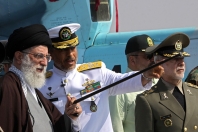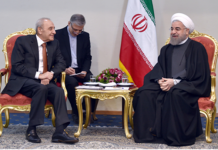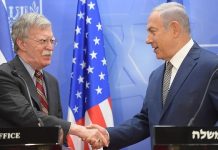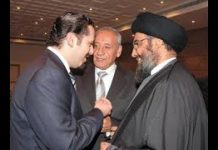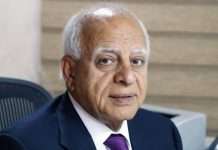Home تعليقات ومقالات مميزة مهدي خلجي/لماذا تعتبر موافقة خامنئي الرسمية على الاتفاق النووي مهمة؟/Mehdi Khalaji/Why Khamenei’s...
لماذا تعتبر موافقة خامنئي الرسمية على الاتفاق النووي مهمة؟
مهدي خلجي/معهد واشنطن
19 آب/أغسطس 2015
في خطاب متلفز ألقاه المرشد الأعلى الإيراني آيه الله علي خامنئي في 17 آب/أغسطس، علق على الاتفاق النووي مع دول «مجموعة الخمسة زائد واحد» بتعابير مشككة، مشيراً إلى أن قرار الموافقة على الاتفاق ما زال غير واضح في كل من واشنطن وطهران. فكما فعل منذ تموز/يوليو، تجنب المرشد الأعلى بشكل متعمد الموافقة على الاتفاق، بعد أسبوع من النقاشات الحادة في إيران حول آرائه بشأن الوثيقة.
ما هو رأي خامنئي الفعلي بشأن الاتفاق؟
في عدد صحيفة “كيهان” الصادر في 15 آب/أغسطس، كتبت الشخصية النافذة حسين شريعتمداري، افتتاحية بعنوان “الخيار الوحيد”، اعتبر فيها أن كل من يراجع تصريحات خامنئي سيستنتج حتماً أن المرشد الأعلى “مدرك تمام الإدراك لعيوب الاتفاق وتداعياته الكارثية”. وتابع:
“يمكن الجزم أن ]خامنئي] غير راضٍ عن الصيغة الحالية للاتفاق على الإطلاق، وإلا ما السبب لترديده مراراً وتكراراً عبارة ‘لن نتخلى عن مبادئ الثورة سواء تمت الموافقة على النص المُصاغ أم لا’، نظراً لأن لديه معرفة وافية باتفاق فيينا؟ لذلك هذا هو الواجب غير القابل للنقاش، المفروض على المسؤولين الذين يقومون بمراجعة نص اتفاق فيينا: إن عدم الموافقة على أي ‘مادة’،أو ‘فصل’ أو ‘محتوى’ يتعارض مع مبادئ الإسلام وركائزه، ومع الثورة، ومع وجود النظام، لكي لا يشعر هؤلاء بتأنيب الضمير اليوم تجاه الشعب وغداً أمام الله سبحانه وتعالى”.
وادعى شريعتمداري أن “جميع المسؤولين والخبراء، من دون استثناء، يعترفون بأن هناك أجزاء من اتفاق فيينا وقرار [مجلس الأمن الدولي] رقم 2231 التي هي ليست فقط غير متوافقة مع مبادئ الثورة والنظام وركائزهما، بل أيضاً تشكل خطراً عليهما، وإذا ما طُبقت فقد تكون كارثية”. واعتبر أن بعض المسؤولين قد ينادون بوجوب تبنّي الاتفاق بالرغم من هذا “الاعتراف” لأنهم يعتقدون أن “حق ‘التحفظ’ سيشكل حلاً”. ولتفسير هذه النقطة، دخل في مناقشة تقنية حول اتفاقية فيينا لعام 1969 بشأن “قانون المعاهدات”، التي تمنح الدول حق التعبير رسمياً عن تحفظاتها بشأن اتفاق هي في صدد الموافقة عليه. ولكنه أوضح أن هذا البند لا ينطبق على الاتفاق النووي لأنه يمكن فقط التعبير عن التحفظات في الاتفاقيات متعددة الأطراف، بينما تشكل «خطة العمل المشتركة الشاملة» اتفاقية ثنائية بين إيران وطرف واحد آخر هو دول «مجموعة الخمسة زائد واحد». وبغض النظر إن كان محقاً أم لا، فقد استخدم هذه الحجة لكي يخلص إلى أن: “هناك طريقتان فقط للتعامل مع اتفاق فيينا: إما تبنيه بالكامل أو رفضه بالكامل. وليس هناك طريقة أخرى يمكن تصورها”. وفي رأيه، يكمن الحل الأمثل بـ “الاعتراض على «خطة العمل المشتركة الشاملة» كلها ورفضها بالكامل. هل هناك أي خيار آخر؟”
إن شريعتمداري ليس أحد المتشددين العاديين فحسب، بل اعتُبر على مدى عقدين تقريباً الناطق باسم خامنئي، والشخص الذي يكشف عن الانطباعات الحقيقية للمرشد الأعلى عندما لا يرغب خامنئي نفسه بالتحدث علناً عن رأيه لأسباب سياسية أو غيرها. ففي عدة حالات واجه فيها المتشددون صعوبة في معرفة رأي المرشد الأعلى حول مسألة معينة، كانوا يقرأون بدقة تصريحات شريعتمداري، وخاصة افتتاحياته في صحيفة “كيهان”، التي يديرها خامنئي. وبالتالي، أصبح شريعتمداري الناطق غير الرسمي باسم المرشد الأعلى، وتعتبر كتاباته بمثابة دليل عملي للمتشددين في عدة مؤسسات، بما فيها “مجلس الشورى” (“المجلس”).
ويقيناً، اعترض بعض المتشددين على هذا الرأي. ففي مقالة صدرت في 16 آب/أغسطس على الموقع الإلكتروني لوكالة “تسنيم”، انتقد المسؤول حميد رضا مقدم فر تصريحات شريعتمداري وسمعته كناطق باسم خامنئي، متسائلاً: “كيف يمكن لأخ لنا في الثورة، مثلك، أن يصر على الإيحاء لقرائه بأن ‘[خامنئي] يعتقد مثلي، ويحلل مثلي، ويفهم مثلي’؟… يجب أن تعبر عن آرائك الشخصية على الأكثر وأن لا تتحدث نيابة عن المرشد الأعلى”. ونظراً إلى مصدر الاقتباس – وكالة “تسنيم” تابعة لـ «فيلق الحرس الثوري الإسلامي» ومقدم فر هو نائب الشؤون الثقافية لهذه المنظمة العسكرية – نستنتج أن هناك على الأقل بعض العناصر في «الحرس الثوري الإسلامي» التي تدعم الاتفاق النووي، وأن الرئيس حسن روحاني سيعوّل عليها على الأرجح لمقاومة ضغوط المتشددين.
ولكن بالرغم من الانتقادات الموجهة إلى مقدم فر، لم ينفِ خامنئي أو شركاؤه ادعاءات شريعتمداري التي نشرها في 15 آب/أغسطس. بالإضافة إلى ذلك، إن الخطاب الذي ألقاه خامنئي بعد يومين عزز بشدة الانطباع بأن كتابات شريعتمداري لا تعبر فقط عن الآراء الشخصية للمحرر. فعلى غرار التصريحات السابقة، سلط الخطاب الضوء على فتور المرشد الأعلى تجاه اتفاق “من غير الواضح لا في إيران ولا في الولايات المتحدة” ما إذا كان سيتم تبنيه أو رفضه، من خلال قوله:
“لم تعد أمريكا تتمتع بالمصداقية ذاتها في المنطقة، [فالأمريكيون] يريدون استعادة هذه المصداقية. هذا ما ينوون فعله في بلادنا أيضاً. كان لديهم مثل هذا الوهم بأنه خلال المفاوضات النووية… كانوا ينوون إيجاد وسيلة للتغلغل إلى البلاد. لكننا قطعنا هذا الطريق أمامهم… لن نسمح بتغلغلهم الاقتصادي في إيران، ولا بنفوذهم السياسي، ولا بوجودهم السياسي ولا بتأثيرهم الثقافي. سنتصدى لهم بكل الوسائل ولن نسمح بذلك، والحمد الله وسائلنا قوية اليوم”.
ومضى قائلاً: “تتناقض سياساتنا في المنطقة مع السياسات الأمريكية… فنحن ندافع عن المقاومة في المنطقة، ندافع عن المقاومة الفلسطينية… ندعم كل من يحارب إسرائيل ويقضي على النظام الصهيوني ويدافع عن المقاومة… ندعم كل من يواجه النظام الصهيوني بكل ما أوتينا من قوة ودعم”. كما كرر أن إيران ستقدم أي نوع من المساعدة الممكنة لـ “الشعب المضطهد” في البحرين واليمن. وأخيراً، كرر ما يقصده بـ “العدو”: “في ثقافتنا السياسية، نتداول عبارة “نظام الهيمنة”، التي تعني أن العالم منقسم بين ]القوى] المهيمِنة و]الكيانات] الخاضعة… من يقود ]القوى] المهيمِنة هو العدو. وإذا ما أردنا معرفة ]من هو هذا العدو]، فهو نظام الولايات المتحدة الأمريكية، ]الذي] يجسد نظام الهيمنة بامتياز”.
المحصلة
ما زالت الإجراءات القانونية الإيرانية للموافقة على الاتفاق النووي غير واضحة. فالمرشد الأعلى يرفض الإعلان بصراحة – ليس فقط عن رأيه الشخصي تجاه الاتفاق، بل أيضاً عن المؤسسة التي يجدر بها اتخاذ القرار الرسمي بالموافقة على الاتفاق أو رفضه. إن هذا الغموض المتعمد يسمح للمتشددين بالضغط على روحاني لإحالة الاتفاق كمشروع قانون إلى “المجلس”. وفي حين وقّع 201 نائباً من أصل 290 على كتاب يطالب الحكومة بإحالة الاتفاق إلى “المجلس” للموافقة عليه، تُظهر تصريحات الأمين العام لـ “مجلس صيانة الدستور” أحمد جنتي في 15 آب/أغسطس، أن حتى هذه الهيئة تنتظر توجيهات خامنئي في هذا الإطار، علماً أن تفسيراتها للقانون تمثل كلمة الفصل الأخيرة بين “المجلس” وحكومة روحاني.
وكما ذُكر في مراصد سياسية سابقة (انظر “مخاوف إيران الأمنية والجدل القانوني حول الاتفاق النووي”)، يفضل الرئيس روحاني بأن يكون “المجلس الأعلى للأمن القومي” هو الذي يصوت على القرار. ولا تنبع هذه الرغبة من خوفه من رفض “المجلس” للاتفاق فحسب، بل من علمه أيضاً أن قرار “المجلس الأعلى للأمن القومي” لن يدخل حيز التنفيذ إلا بعد موافقة المرشد الأعلى رسمياً عليه، وهذا يعني أنه سيتوجب على خامنئي اتخاذ موقف واضح من الاتفاق. وفي المقابل، لن يتعين على خامنئي اتخاذ موقف تجاه مشروع قرار يُعرض على “المجلس”، فهو غالباً ما يملي قراراته على البرلمان من وراء الكواليس ومن دون الكشف عن دوره علناً. وإذا استطاع المرشد الأعلى الحفاظ على موقفه غامضاً على المدى الطويل، فسيفتح المجال لانتقاد الاتفاق وحتى الانسحاب منه، وهذا ما حدث تماماً للاتفاقين النوويين عامي 2003 و 2004. إن روحاني على وعي تام بتلك التجربة لأنه كان كبير المفاوضين النوويين في ذلك الوقت.
وللمساعدة على تجنب هذا السيناريو، يمكن لـ «مجموعة الخمسة زائد واحد» أن تشير لروحاني بصراحة أن «خطة العمل المشتركة الشاملة» قد لا تكون مستدامة دون موافقة صريحة من خامنئي، مرتكزةً على تجربة العامين 2003 و2004. وقد روى روحاني بنفسه هذه التجربة في كتابه بعنوان “الأمن القومي والدبلوماسية النووية”، الذي نشره قبل 4 سنوات للنأي بنفسه عن الانتقادات المتزايدة من قبل خامنئي والمتشددين بشأن المفاوضات التي قادها بصفته رئيس “المجلس الأعلى للأمن القومي”. كما يمكن لمسؤولي «مجموعة الخمسة زائد واحد» أن يشيروا إلى التناقض بين تبنيهم الناشط لـ «خطة العمل المشتركة الشاملة» وبين صمت خامنئي. أما بالنسبة إلى واشنطن، فسيسهل بالطبع على الرئيس الأمريكي باراك أوباما إقناع الكونغرس بالموافقة على الاتفاق إذا بادر خامنئي بنفسه إلى ذلك.
**مهدي خلجي هو زميل “ليبيتزكي فاميلي” في معهد واشنطن.
Why Khamenei’s Official Approval of the Nuclear Deal Matters
Mehdi Khalaji/Washington Institute
August 19, 2015
If the Supreme Leader is able to continue his strategy of purposeful ambiguity by manipulating the media and parliament, the current deal could fall apart just as easily as past nuclear agreements.
In a televised speech delivered August 17, Ayatollah Ali Khamenei commented on the P5+1 nuclear agreement in skeptical terms, noting that the decision about whether to approve the deal is still unclear in both Washington and Tehran. As he has done since July, the Supreme Leader also pointedly avoided approving the agreement, after a week of vigorous debate in Iran about his views on the document.
WHAT KHAMENEI REALLY THINKS ABOUT THE DEAL
In the August 15 edition of Kayhan newspaper, influential figure Hossein Shariatmadari wrote an editorial titled “The Sole Option.” In it, he argued that anyone who reviewed Khamenei’s statements would be forced to conclude that the Supreme Leader is “fully aware of the deal’s inadequacies and its disastrous ramifications.” He continued:
“It can certainly be said that [Khamenei] is not happy with the existing draft of the deal at all. Otherwise why did he repeatedly emphasize that ‘We would not give up the revolution’s principles whether the drafted text gets approved or not,’ given the fact that he had in-depth knowledge of the Vienna deal? So this is the unnegotiable duty of the officials who review the Vienna deal’s text: to not approve any ‘article,’ ‘chapter,’ or ‘content’ that is at odds with the principles and foundations of Islam, revolution, and the existence of the regime, so that they will not have a guilty conscience today before the people and tomorrow before the almighty God.”
Shariatmadari claimed that “all officials and experts — with no exception — confess that parts of the Vienna deal and [UN Security Council] Resolution 2231 not only are incompatible with the principles and foundations of the revolution and regime, but also threaten them, and if they are implemented they might be disastrous.” According to him, some officials might argue that the deal should be endorsed despite this “confession” because they believe “the ‘reservation’ right would be a solution.” To explain this point, he went into a technical discussion of how the 1969 Vienna Convention on the Law of Treaties gives countries the right to formally express reservations about an agreement they are approving. Yet he argued that this provision would not apply to the nuclear deal because reservations can only be made in multilateral conventions, while the Joint Comprehensive Plan of Action (JCPOA) is a bilateral convention between Iran and one other party, the P5+1. Whether or not he is correct, he used this argument to conclude that “there are only two ways of dealing with the Vienna agreement: full endorsement or full rejection. There is no other conceivable way.” In his view, the answer is “to say no to the whole JCPOA and fully reject it. Is there any other option?”
Shariatmadari is not just another hardliner. For almost two decades, he has been seen as Khamenei’s mouthpiece, the one who reveals the Supreme Leader’s true impressions when Khamenei himself does not wish to publicly speak his mind for political or other reasons. In many cases where hardliners have difficulty figuring out Khamenei’s opinion on an issue, they carefully read Shariatmadari’s statements — especially his editorials in Kayhan, which is run by Khamenei. Shariatmadari has therefore become the Supreme Leader’s unofficial spokesman, and his words serve as a practical guide for hardliners in various institutions, including the Majlis.
To be sure, some hardliners have contested this view. In an August 16 article on the Tasnim website, official Hamid Reza Moghaddamfar criticized Shariatmadari’s remarks and his reputation as Khamenei’s mouthpiece: “How come a revolutionary brother such as you insists on suggesting to his readers that ‘[Khamenei] thinks like me, analyzes like me, and understands like me’?…At most you should express your own views and not speak on behalf of the Supreme Leader.” Given the source of the quote — Tasnim is affiliated with the Islamic Revolutionary Guard Corps, and Moghaddamfar is the military organization’s cultural deputy — there are at least some IRGC elements who support the nuclear deal, and President Hassan Rouhani will probably count on them in resisting hardliner pressure.
Yet despite Moghaddamfar’s criticism, neither Khamenei nor his associates denied Shariatmadari’s August 15 claims. Moreover, Khamenei’s speech two days later greatly enhanced the perception that Shariatmadari’s writings are not simply the editor’s personal views. Similar to past remarks, the speech emphasized the Supreme Leader’s lack of enthusiasm about a deal whose endorsement or rejection “is clear neither here nor in America”:
“America does not have the same credentials in this region that it used to have. They want to restore it. This is their intention in our country too. They had such a delusion that in the course of nuclear negotiations…they intended to find a tool to penetrate into the country. We blocked their way…We would allow neither [their] economic influence on Iran, nor their political influence, nor their political presence, nor their cultural influence. By all means — and, thank God, our means are strong today — we would confront them and would not allow it.”
He went on: “Our policies in the region are on the opposite side of America’s policies…We defend the resistance in the region, we defend the Palestinian resistance…We support anyone who fights against Israel, demolishes the Zionist regime, and advocates resistance…We support anyone who confronts the Zionist regime with every kind of support we are capable of.” He also repeated that Iran would provide any kind of assistance it can to the “oppressed people” of Bahrain and Yemen. Finally, he reiterated what he means by “enemy”: “In our political literature we have the term “domination order,” meaning the world is divided between dominant [powers] and dominated [entities]…Those who lead the dominant [powers] are the enemy. If we want to make a case for [who this enemy is], it would be the United States of America regime, [which] is the manifestation of the domination order par excellence.”
CONCLUSION
Iran’s legal procedure for approving the nuclear deal remains unclear. The Supreme Leader refuses to explicitly state not only his own judgment on the deal, but also which institution should make the formal decision of approval or rejection. This deliberate ambiguity is allowing hardliners to pressure Rouhani into sending the deal as a bill to the Majlis. While 201 of the 290 member of parliament signed a letter demanding that the government submit the agreement to the Majlis for approval, statements made by Guardian Council secretary Ahmad Jannati on August 15 show that even that body — whose interpretation of law would be the final arbiter between the Majlis and Rouhani’s government — is waiting to receive instruction from Khamenei.
As noted in previous PolicyWatches (see “Iran’s Security Concerns and Legal Controversies Over the Nuclear Deal”), President Rouhani would prefer that the Supreme National Security Council vote on it. This desire stems from more than just his fear that the Majlis might reject the deal; he also knows that a National Security Council decision would become legally effective only after the Supreme Leader’s official approval, meaning Khamenei would have to take an explicit stand on the deal. In contrast, Khamenei would not need to take a stand on a Majlis bill; he frequently dictates the parliament’s decisions from behind the scenes without his role being publicly acknowledged. If the Supreme Leader is able to keep his position ambiguous in the long term, he would leave room for criticizing and even walking away from the deal — which is exactly what happened to the 2003 and 2004 nuclear deals. Rouhani is acutely conscious of that experience because he was the chief nuclear negotiator at the time.
To help avoid this scenario, the P5+1 could point out bluntly to Rouhani that the JCPOA may not be sustainable without an explicit endorsement from Khamenei, citing the 2003-2004 experience. Rouhani himself provided a narrative of that experience in his book National Security and Nuclear Diplomacy, which he published four years ago to protect himself against mounting criticism from Khamenei and the hardliners regarding the negotiations he had led in his capacity as head of the Supreme National Security Council. P5+1 officials could also note the contrast between their own active embrace of the JCPOA and Khamenei’s silence. In Washington’s case, it would certainly be easier for President Obama to persuade Congress to approve the deal if Khamenei did so himself.
Mehdi Khalaji is the Libitzky Family Fellow at The Washington Institute.
















